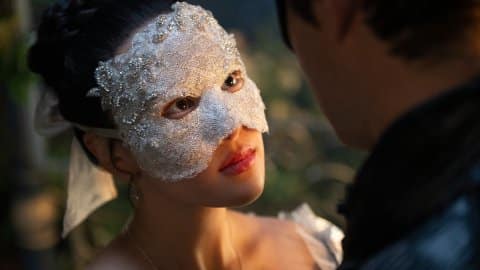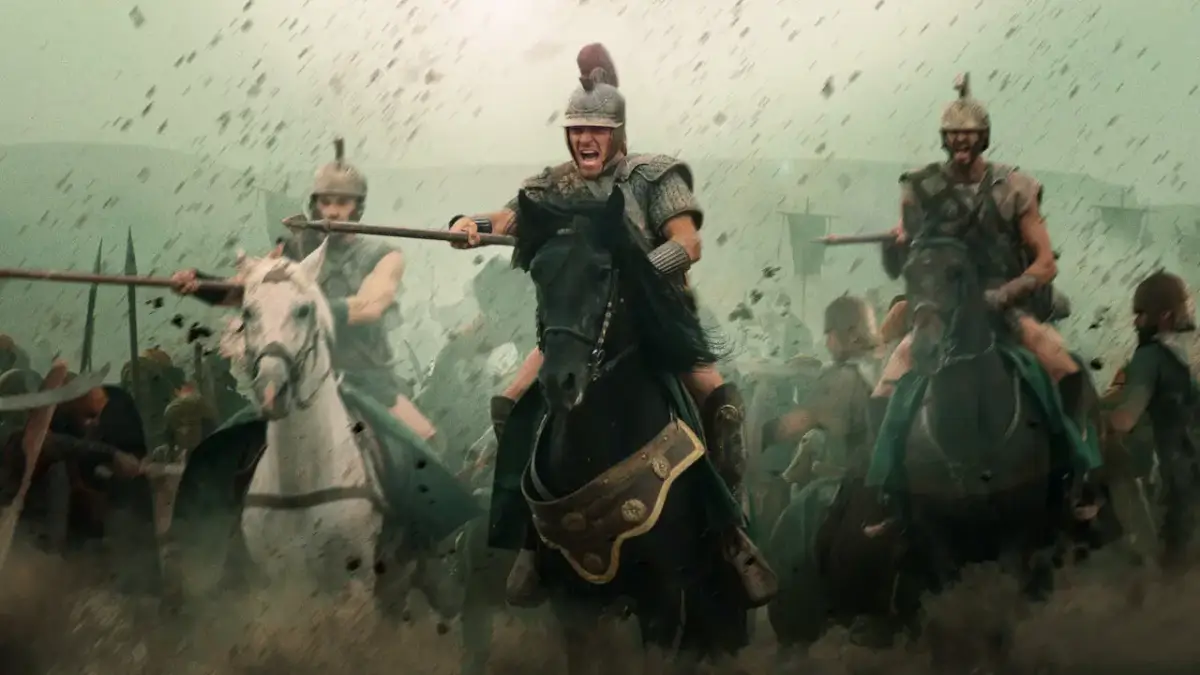
Picture: Alexander: The Making of a God – Netflix
Alexander: The Making of a God or Alexander: The Making of another poorly received Netflix docu-drama? Once again, Netflix finds itself at the heart of spirited debate online as a brand new historical docu-drama about Alexander the Great comes under fire.
In recent years, Netflix has stepped up its output of documentary dramas. Made with the intention to educate and entertain, the entertainment side has often gotten in the way of education as historians, scholars, and history buffs have had their say on what Netflix has gotten wrong.
In the not-too-distant past, Netflix came under fire for portraying one of Egypt’s most famous and beloved ancient monarchs, Cleopatra. While not a docu-drama, the character of King Yaroslav the Wise in Vikings: Valhalla was criticized for being inaccurately described as Russian over Kyivan Rus.
Now, Netflix is at the center of another historical controversy in the six-part docu-drama Alexander: The Making of a God from Lion Television, showrunner Tony Mithcell (The Bible), and head writer Christopher Bell (The Last Czars).
Who was Alexander The Great?
Before diving into the controversy of the series, allow us to provide some context as to who Alexander The Great was.
Alexander the Great, one of the brightest military commanders of the ancient world, was one of the greatest conquerors in history.
Born in 356 BC in Pella, the capital of Macedon, Alexander was the son of Phillip II, the King of Macedonia. At 13, he was tutored by Aristotle, one of the greatest Greek philosophers of the ancient world. By 20, after the assassination of his father, Alexander ascended to the throne.
Alexander consolidated his power by eliminating rivals to the throne. Several states tried to take advantage of his father’s death, leading Alexander to put down revolts from Athens, Thebes, Thessaly, and several Thracian tribes within North Macedon.
Once his power had been secured, the young ruler began a military campaign the likes of which the ancient world had never seen before. At its peak, Alexander’s empire expanded from the shores of Greece to the sands of Egypt and the exotic sub-continent of India, all within twelve years.
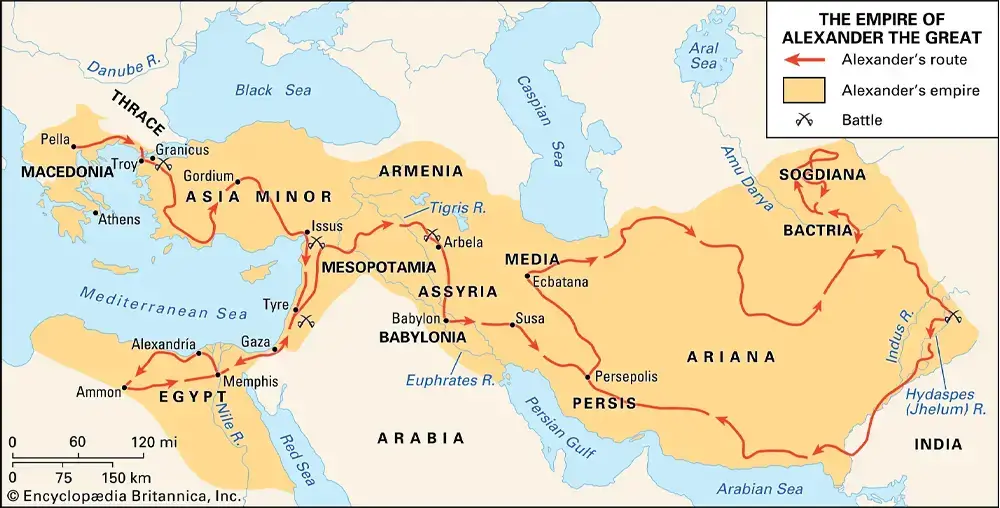
Picture: Alexander the Great’s vast empire -Brittanica Inc.
Alexander the Great died at the age of 32. The expansion of his empire blazed like a raging inferno but was snuffed out like a candlelight. Upon his death, war and chaos followed over 40 years, ending with the establishment of the Ptolemaic Kingdom of Egypt, the Seleucid Empire, and the Kingdom of Pergamon.
Alexander: The Making of a God Netflix Docu-Drama Controversy Explained
Was Alexander the Great gay?
The docu-drama took creative liberties with the rumors of Alexander’s sexuality, in particular his relationship with his childhood friend and cavalry commander Hephaestion.
However, there is no concrete historical evidence that Alexander was a homosexual man. But, thanks to the writings of ancient historians and scholars, this has often led to a spirited debate among modern historians and scholars over Alexander’s sexuality.
It’s widely known that during this period of history, same-sex relationships were practiced openly in Greece. However, many of these relationships were regulated and often dictated by the social status of those involved. Homophobia still existed but was far less prevalent than what was to come in the following centuries.
As for Alexander, it was recorded by first-century Roman historian Quintus Curtius Rufus that his mother Olympias had concerns over her son’s lack of interest in women;
“He scorned sensual pleasures to such an extent that his mother was anxious lest he be unable to beget offspring.”
Alexander’s mother had even hired a famous Thessalian courtesan named Callixena to sleep with her son, but with no success.
Plutarch, a Greek historian, recorded that the only woman Alexander had slept with before his first marriage was Barsine, daughter of Artabazos II of Phrygia. The pair were rumored to have had an illegitimate child named Heracles.
Alexander was rumored to have sired a number of illegitimate children, but of his three marriages, he only fathered one child, Alexander IV, with Roxana of Bactria.
For millennia, ancient historians and modern historians have debated over Alexander’s supposed lack of interest in women as either evidence of his self-control or as evidence of his homosexuality.
The truth is often far from straightforward. Given Alexander was alive over 2300 years ago, his sexuality will forever be questioned and debated.
Incorrect Weapons and Tactics of Alexander’s Army
Alexander conquered so much of the ancient world in such a short period because of his military genius and the equipment used by his armies.
The most famous infantry formation used by Alexander, which was invented by his father Philip, was the Macedonian Phalanx. Each phalangite of the Phalanx carried a sarissa, a double-pointed pike that reached over 18ft (6 meters) and weighed around 14.5 lbs. A phalangite also carried a shortsword called a xiphos.
The Phalanx formation, or syntagmata, consisted of 256 men commanded by a syntagmatarch. In close combat, the tall sarissa would have been rendered useless, so Philip and Alexander used the Phalanx to hold an enemy army in place while heavy cavalry broke through their ranks.
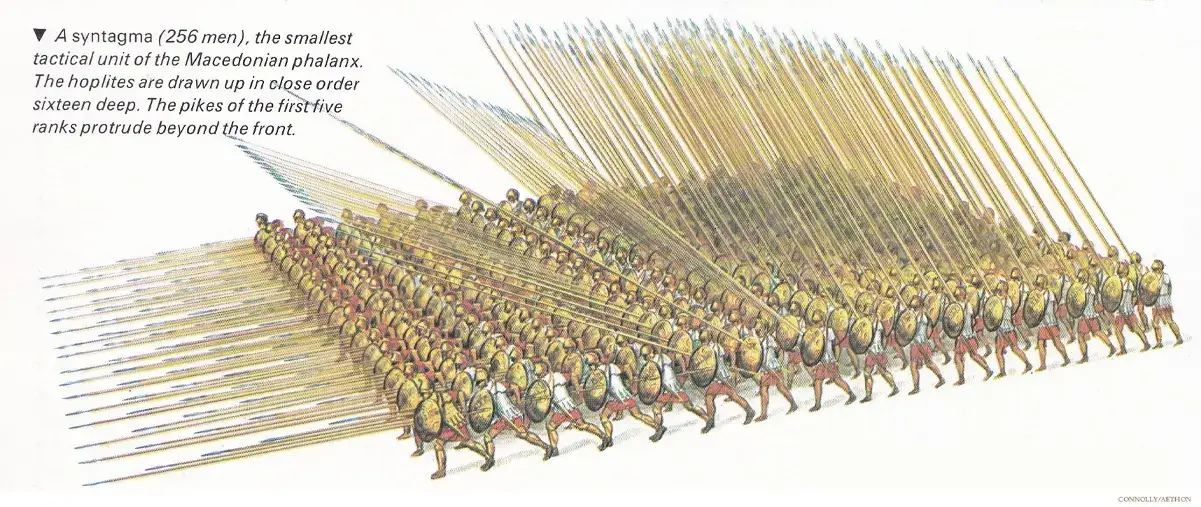
Pictured: An illustration of the Macedonian Phalanx
Arguably, the biggest sin of the series was the omission of showing off Alexander’s military genius and the formations he used to conquer most of the known world. The battles shown were nothing more than what is typically seen in Hollywood: two opposing armies clashing head-on with little regard for military tactics.
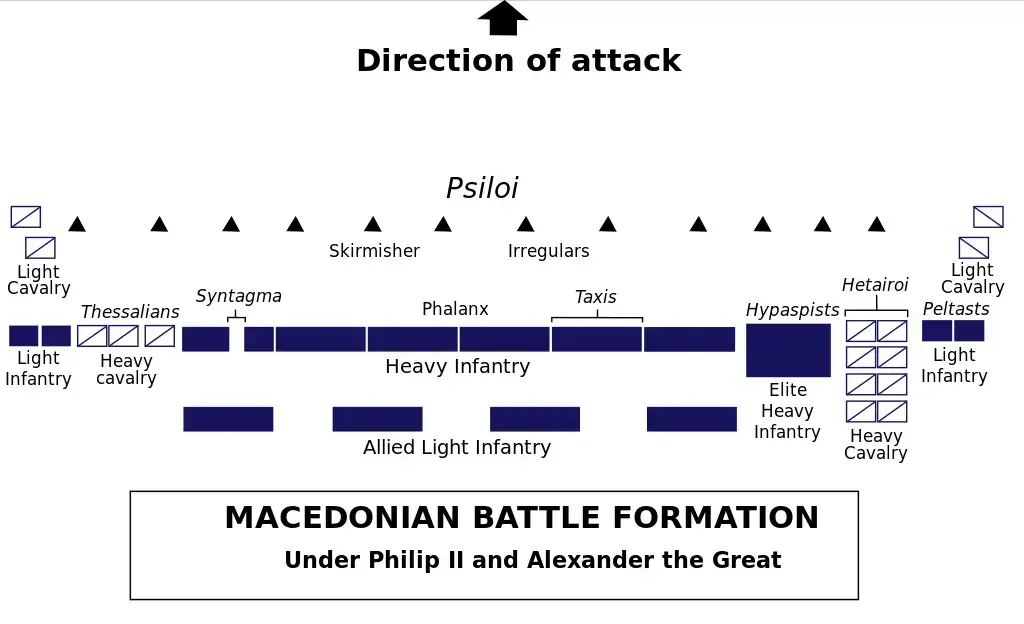
Picture: The battle formation of the Macedonian army under Phillip II and Alexander the Great
Not only was there no mention of the Macedonian Phalanx or Companion cavalry, but the equipment showcased by the actors was incredibly inaccurate. The spears shown were far too short to match the sarissa used by the Phalanx formation in Alexander’s army, instead coming closer to the length of a Hoplite dory.
Rushing Alexander’s Story
With a lack of emphasis on Alexander’s military prowess, it’s surprising how many events from his reign are missing from the series. In particular, the pacification of Greece and consolidating power within his kingdom.
When Alexander took the throne, several states revolted, which resulted in Alexander’s first taste of military action as king against several of his subjects. While it is understandable the series can’t cover every single event of his reign, the razing of Thebes was a surprising omission.
There was also the conquest of Asia Minor and Persia, which was told at breakneck speed to feature more scenes involving his personal relationships. Lastly, unless the series intends to go for a second season, they also missed Alexander’s conquest of India, which at one stage resulted in his men’s mutiny as they refused to cross the Ganges River. While besieging the Malian capital of Malhi, Alexander was dealt a dreadful blow when an arrow pierced his armor and penetrated his lung.
The arrow did not kill Alexander, but it wasn’t long after that the campaign and conquest of India was over.
Upon his return to Persia and Babylon, Alexander fell ill, where he would die. From natural causes, diseases, and assassination, lots of theories have been written about the cause of Alexander’s death at the age of 32.
What did you think of Alexander: The Making of a God on Netflix? Let us know in the comments below!


 Rating: TV-14
Rating: TV-14


